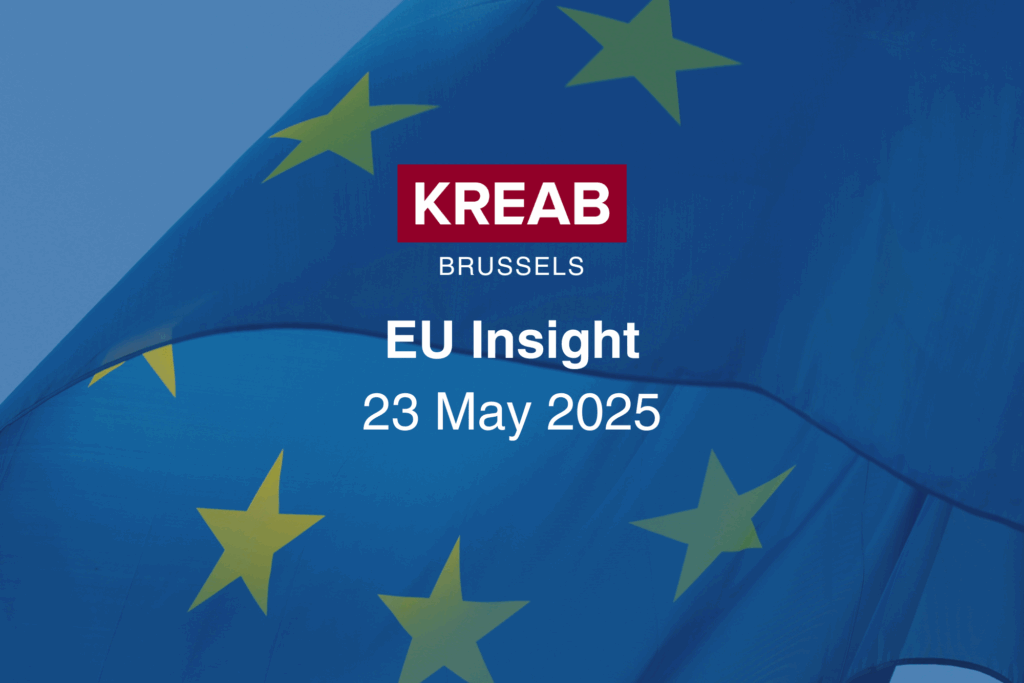
23/05/2025
EU Insight 23 May 2025
Brussels, 23 May 2025
EU-UK: FIRST SUMMIT SINCE BREXIT YIELDS DEAL ON DEFENCE, FISHERIES AND MOBILITY
The EU and UK held the first EU-UK summit since Brexit, aiming to reset relations between the two jurisdictions. The summit yielded an agreement aiming to ease trade and mobility frictions, expanding defence ties, and extending EU fishing access to British waters until 2038. On defence, the EU and UK agreed to also allow UK defence firms to gain access to the EU’s new rearmament fund, labelled SAFE. As for mobility, the agreement includes a commitment to explore options on how the UK could rejoin the EU’s student exchange programme, Erasmus +. Alongside the summit, the European Commission proposed finalising a Competition Cooperation Agreement to boost antitrust coordination between EU and UK authorities. The pact, building on the 2020 Trade and Cooperation Agreement, aims to streamline merger reviews and enforcement.
SINGLE MARKET STRATEGY: COMMISSION LOOKS TO STRENGTHEN INTERNAL BARRIERS
Building on the Draghi and Letta reports, the European Commission published its Single Market Strategy, aiming to strengthen the EU’s single market and leverage it as a tool to boost economic competitiveness. The document outlines a series of planned initiatives to reduce existing barriers within the single market related to trade, investments, business operations and fostering SME cross-border participation and their scaling up capacity. Amongst others the initiatives include the anticipated 28th regime for businesses, a new EU-wide company law regime – expected in 2026 – which should facilitate cross-border business operations. Another notable objective of the strategy relate to digitalization, where the Commission announces its intention to foster a European cloud service marketplace as well as preparing a simplification Omnibus, targeting the “EU digital acquis”.
COMMISSION PROPOSES FOURTH OMNIBUS TO LIGHTEN REGULATORY BURDEN FOR MID-CAPS
Alongside its Single Market Strategy, the European Commission published its fourth Omnibus package, the so-called Mid-cap Omnibus. Overall, the package presents a series of supportive measures aiming to reduce compliance burdens on small and growing companies. Notably, the package introduces a new company size category, a “small mid-cap” (SMC) category, referring to companies with up to 750 employees and certain turnover or asset thresholds, and adjusts regulatory burden imposed on those companies throughout a range of different sectoral legislations. In that sense, SMCs would now gain access to regulatory exemptions traditionally reserved for SMEs, amongst others, from the EU’s data protection Regulation (GDPR). Additionally, the package also postpones due diligence requirements for batteries, aiming so to reduce burden imposed on businesses.
ANTI-DEFORESTATION: COMMISSION PUBLISHES COUNTRY RISK CLASSIFICATION SYSTEM
The European Commission published their country classification under the EU’s controversial Deforestation Regulation. This classification divides countries into different risk categories, which would determine the due diligence responsibilities of the importers of products covered by the Regulation, such as cocoa, coffee, palm oil and rubber. Companies importing these products from high-risk and standard risk countries will face more scrutiny compared to low-risk countries, as the low-risk countries will benefit from simplified due diligence obligations. High-risk countries are those under UN or Council of Europe sanctions (e.g., Russia), while other countries are assessed using UN FAO Forest Resources data. The US, China, and all EU member states are identified as “low-risk”.
THE EU ADOPTS ITS 17th SANCTIONS PACKAGE ON RUSSIA
Following the continuation of Russia’s aggression against Ukraine, the EU adopted its 17th sanctions package. Specifically, the package targets the Russian oil tanker “shadow fleet”, used to circumvent the price cap set on Russian oil in 2022. Additionally, the giant Russian oil company Surgutneftegaz is also in the new package’s crosshairs. Sanctions have also been imposed on many drones, ammunition, weapons and critical components providers coming from both Russia and third countries. Finally, up to 2400 between person and entities are subject to restrictive measures. In addition, the Parliament approved new 50% tariffs on Russian and Belarussian agricultural products. While the most recent package has just been approved, the Commission is already starting work on the 18th sanctions package, as Russia’s war continues to drag on.
COMING UP NEXT WEEK
- 26 May: Foreign Affairs Council (Development).
- 27 May: General Affairs Council. On the agenda: Omnibus I, Omnibus II, Carbon Border Adjustment Mechanism (CBAM).
- 28 May: College of Commissioners. On the agenda: EU Start-up and Scale-up Strategy, Eu strategic approach to the Black Sea region, Simplification of the External Action Guarantee.

Did you like this article? Contact us to hear more about Kreab Brussels’ practice and services.

